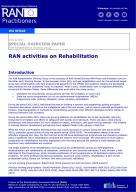Details
- Publication date
- 20 January 2022
- Author
- Directorate-General for Migration and Home Affairs
- RAN Publications Topic
- Rehabilitation
Description
The RAN Rehabilitation Working Group is the successor of RAN Derad/Exit and RAN Prison and Probation (only for the latter part) Working Groups. In the European Union (EU), exit and rehabilitation work for the extremist target group has a brief tradition (the first programmes appeared in the 1990s) and academic insights and developing best practices are still considered ‘works in progress’. What’s more, rehabilitation work is organised differently across the EU Member States. Some differences also exist within the same country.
- Dedicated exit programmes versus general services like probation or social work.
- State-led versus programmes run by non-governmental organisations (NGOs). Programmes under judiciary obligation versus voluntary participation.
During the period 2012-2015, RAN Derad focused on building a network and establishing guiding principles. Important discussions centred on the professional role of the exit worker, and on how to motivate participants and formers. Interchangeability of methods for rehabilitating extremists from different ideologies became topical as Islamist Extremism (IE) increased.
During the period 2016-2019, there was growing attention on rehabilitation due to the (expected) returning foreign terrorist fighters and efforts to safeguard both society and individuals. There was also a need among practitioners and policymakers for more insights on impact, evaluation, and good working methods. This resulted in training sessions (academies) and learning from adjacent fields (cults, gangs) in RAN Exit.
While the Prison and Probation Working Group was mainly focussed on prisons during the first period (2012- 2015), probation gained priority during the second period (2016-2019). The anticipated release of terrorist offenders triggered this. Also, the fact that not all EU MS have dedicated exit programmes and therefore probation plays a significant role in rehabilitation increased the need for more exchange. The importance of multi-agency cooperation on rehabilitation has been highlighted over the years because the process is multi-facetted and therefore many stakeholders are involved.
The target audience of the Rehabilitation working group are professionals working on disengagement, deradicalisation and rehabilitation of radicalised, extremist or even terrorist individuals. A part of them is fully dedicated to this target group, which includes practitioners of exit programmes or of dedicated projects within probation. For some professionals like psychologists, social and youth workers, rehabilitation is part of their professional duties. Others are ‘formers’ who were previously radicalised.
Current working group leaders: Robert Örell (2012-present) and Ioan Durnescu (2019-present).
Previous working group leaders: Harald Weilnböck (Derad 2012–2015), Yola Wanders (P&P 2012–2015) Finn Grav (P&P 2012–2018), Judy Korn (Exit 2015-2019), Angel Lopez Muriel (P&P 2015-2017) & Torben Adams (P&P 2018- 2019)

